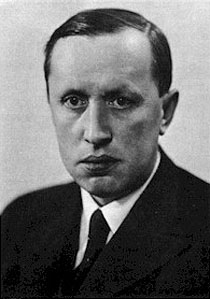Karel Čapek frases e citações
Karel Čapek: Frases em inglês
"On Relativism" (1925)
Contexto: Socialism is good when it comes to wages, but it tells me nothing when it comes to other questions in life that are more private and painful, for which I must seek answers elsewhere. Relativism is not indifference; on the contrary, passionate indifference is necessary in order for you not to hear the voices that oppose your absolute decrees … Relativism is neither a method of fighting, nor a method of creating, for both of these are uncompromising and at times even ruthless; rather, it is a method of cognition. If one must fight or create, it is necessary that this be preceded by the broadest possible knowledge... One of the worst muddles of this age is its confusing of the ideas behind combative and cognitive activity. Cognition is not fighting, but once someone knows a lot, he will have much to fight for, so much that he will be called a relativist because of it.
“To be small, unsettled and uncompleted is a good and courageous mission.”
Letters from England (1925)
Contexto: I have seen greatness and power, wealth, prosperity and incomparable development. I was never sad that we are a small and unfinished part of the world. To be small, unsettled and uncompleted is a good and courageous mission.
R.U.R. supplement in The Saturday Review (1923)
Contexto: Be these people either Conservatives or Socialists, Yellows or Reds, the most important thing is — and that is the point I want to stress — that all of them are right in the plain and moral sense of the word... I ask whether it is not possible to see in the present social conflict of the world an analogous struggle between two, three, five equally serious verities and equally generous idealisms? I think it is possible, and that is the most dramatic element in modern civilization, that a human truth is opposed to another human truth no less human, ideal against ideal, positive worth against worth no less positive, instead of the struggle being as we are so often told, one between noble truth and vile selfish error.
R.U.R. supplement in The Saturday Review (1923)
Contexto: Be these people either Conservatives or Socialists, Yellows or Reds, the most important thing is — and that is the point I want to stress — that all of them are right in the plain and moral sense of the word... I ask whether it is not possible to see in the present social conflict of the world an analogous struggle between two, three, five equally serious verities and equally generous idealisms? I think it is possible, and that is the most dramatic element in modern civilization, that a human truth is opposed to another human truth no less human, ideal against ideal, positive worth against worth no less positive, instead of the struggle being as we are so often told, one between noble truth and vile selfish error.
"On Relativism" (1925)
Contexto: Socialism is good when it comes to wages, but it tells me nothing when it comes to other questions in life that are more private and painful, for which I must seek answers elsewhere. Relativism is not indifference; on the contrary, passionate indifference is necessary in order for you not to hear the voices that oppose your absolute decrees … Relativism is neither a method of fighting, nor a method of creating, for both of these are uncompromising and at times even ruthless; rather, it is a method of cognition. If one must fight or create, it is necessary that this be preceded by the broadest possible knowledge... One of the worst muddles of this age is its confusing of the ideas behind combative and cognitive activity. Cognition is not fighting, but once someone knows a lot, he will have much to fight for, so much that he will be called a relativist because of it.
The Absolute at Large (1921)
Contexto: I've tried all isolating materials that might possibly prevent the Absolute from getting out of the cellar: ashes, sand, metal walls, but nothing can stop it. I've even tried lining the cellar walls with the works of Professors Krejci, Spencer, and Haeckle, all the Positivists you can think of; if you can believe it, the Absolute penetrates even things like that.
Sgt. Bartosek, in "Šlépeje" ["Footprints"] (1929) as translated by Norma Comrada, in Toward the Radical Center: A Karel Čapek Reader (1990), edited by Peter Kussi, p. 236
Contexto: Look, justice has to be as unquestioned as the multiplication tables. I don’t know if you could prove that every theft is wrong; but I can prove to you that every theft is against the law, because I can arrest you every time. If you scattered pearls in the street, then a policeman could give you a ticket for littering. But if you started performing miracles, we couldn’t stop you, unless we called it a public nuisance or unlawful public assembly. There must be some kind of breach of order for us to intervene.
"On Literature" in Toward the Radical Center : A Karel Čapek Reader (1990) http://www.catbirdpress.com/bookpages/reader.htm, edited by Peter Kussi
“Great god of the Ants, thou hast granted victory to thy servants. I appoint thee honorary Colonel.”
Pictures from the Insects' Life (1922), as translated in 'And so ad infinitum (The Life of the Insects) : An Entomological Review in Three Acts, a Prologue and an Epilogue (1936) co-written with his brother Josef Čapek, p. 60; also known as The Insect Play
